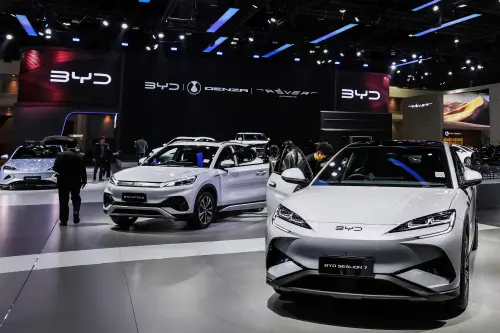Chinese electric vehicle giant BYD aims to double its sales outside China to over 800,000 cars by 2025 and plans to overcome tariffs by assembling vehicles locally, according to its chairman during an earnings call.
After selling 417,204 units overseas in 2024, the company anticipates a "substantial rise" in its market share in Britain, which is receptive to competitive Chinese products. BYD also sees "great opportunities" for rapid growth in Latin America and Southeast Asia, where government and public sentiment is favorable toward Chinese brands.
As various governments consider or impose tariffs on Chinese-made cars, BYD intends to maintain its cost advantage by sourcing key components from China and assembling vehicles in local markets, although specific countries were not mentioned.
BYD is expanding globally, opening showrooms in markets from Australia to Germany to mitigate challenges from intense domestic pricing competition. The company has stated that exports will play a crucial role in its profitability. During the recent call, the chairman expressed confidence that a majority of BYD's profits will come from overseas markets at some stage, though he did not specify a timeline.
The company plans to establish factories overseas independently, given its ample funding. Currently, BYD is building a factory in Brazil, its largest market outside China, which faced delays last year. Additional factories are being constructed in Thailand, Hungary, and Turkey.
However, there are no short-term plans to sell in Canada and the United States due to geopolitical factors, particularly ongoing tariffs of 100% on Chinese-made EVs imposed by the Trump administration and Canada.
The chairman asserted that BYD's profitability per vehicle will surpass that of Toyota once it reaches a similar scale, citing better cost control measures. Toyota, the world's leading automaker by sales, sold 10.8 million vehicles in 2024, while BYD sold 4.27 million.
With a sales target of 5.5 million units this year, BYD has disrupted the Chinese auto market with affordable models, such as the Seagull electric hatchback priced below $10,000, which includes smart driving features at no extra charge for most of its lineup.
BYD plans to expand its team focused on intelligent software and semiconductor components from 5,000 to as many as 8,000 employees, although a timeline for this expansion was not provided. The company also aims to introduce its affordable smart driving technologies to the global market by 2026 or 2027, with plans to send more employees overseas to support this initiative.
